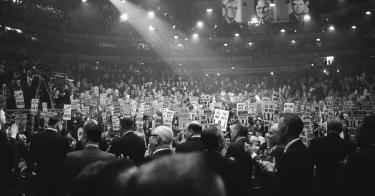Is it unthinkable that the Federal Bureau of Investigation would spy on a presidential campaign for political purposes? I can personally attest that it has happened before—during Barry Goldwater’s 1964 campaign.
Every poll agreed that President Lyndon B. Johnson would easily win the election against the conservative Sen. Goldwater of Arizona. But LBJ wanted a landslide so he could implement his Great Society vision without resistance and go down in history as one of America’s greatest presidents. For Johnson, extremism in the pursuit of victory was no vice.
Thus was born Johnson’s “Anti-Campaign” to smear Goldwater’s candidacy. The operation was run from the second floor of the West Wing by veteran Washington-based Democrats like Leonard Marks, who would become director of the U.S. Information Agency, and Daniel Patrick Moynihan, then an assistant secretary of labor and later a U.S. senator from New York.
Typical of their black-bag politics was scheduling Democratic speakers before and after Goldwater’s appearance in a city, smothering his message with pro-Johnson, anti-Goldwater rhetoric. Advance knowledge of Goldwater’s travel schedule and advance copies of his remarks were provided by a spy the Central Intelligence Agency had planted in Goldwater headquarters.
Former intelligence officer E. Howard Hunt, best known for his role as an orchestrator of the Watergate bugging, told a Senate committee in 1973 that his CIA superior had ordered him to infiltrate the Goldwater campaign. Hunt claimed to have questioned the order, only to be told that it had been a personal request of President Johnson and that the information he recovered would be delivered to a White House aide.
CIA Director William Colby confirmed the White House’s role in the illegal surveillance while addressing a congressional hearing in 1975. That the CIA is prohibited by law from operating within the U.S. didn’t matter to the Johnson campaign. The Goldwater people never suspected that one of them was a spy for the Democrats.
One of the Anti-Campaign’s writers was John Roche, later president of Americans for Democratic Action. “We used to get advance copies of Senator Goldwater’s key speeches,” he admitted, enabling them to have speakers primed to reply “before Goldwater had even opened his mouth.” When Roche asked how they got the speeches, “the reply was ‘Don’t ask.’ ”
That wasn’t all. The Anti-Campaign enlisted the FBI, even though the bureau is supposed to limit its investigations to people and institutions considered dangerous to national security. That shouldn’t have included the presidential candidate of a major political party who was also a sitting senator and a two-star general in the Air Force Reserve. Barry Goldwater was not a Manchurian candidate.
Nevertheless, the FBI arranged for widespread wiretapping of the Goldwater campaign. Sure enough, campaign reporters could soon be heard asking specific questions about the candidate’s travel plans that had only been discussed by Goldwater aides behind closed doors. To protect themselves, Goldwater staffers began using pay telephones outside their headquarters.
Goldwater later revealed that two reporters had asked him about a proposal he had yet to make public—that if elected he would ask Dwight Eisenhower to go to Vietnam and report on his findings. He had discussed the possible Eisenhower visit only with his top aides. But the reporters swore they had heard about it from the White House.
Johnson also illegally ordered the FBI to conduct security checks of Goldwater’s Senate staff. Cartha “Deke” DeLoach, the FBI’s liaison with the White House and a top aide to Director J. Edgar Hoover, denied at a 1975 Congressional hearing that the bureau had investigated Goldwater’s staff. But through the Freedom of Information Act, I obtained copies of FBI memoranda detailing the results of the bureau’s illegal file check of 15 Senate staffers. “No derogatory information was located concerning” any of the people in Goldwater’s Senate office, stated one memo that bore DeLoach’s initials.
In 1971 Robert Mardian, who had been a regional director in the Goldwater campaign, became assistant attorney general for internal security. During a two-hour briefing with Hoover, Mardian asked about the procedures for electronic surveillance. To Mardian’s amazement, Hoover confessed that in 1964 the FBI had wired the Goldwater campaign plane, under orders from the White House. When Mardian asked Hoover why he had complied, the director answered, “You do what the president tells you to do.”
In a later conversation with Mardian, William C. Sullivan, the bureau’s No. 2 man, verified the FBI’s spying operation against the Goldwater campaign. In a 1992 interview, Mardian told me that Sullivan was appalled at LBJ’s partisan use of the bureau.
Did the FBI infiltrate or surveil the Trump campaign for political purposes? If so, it wouldn’t be the first time.
This piece originally appeared in The Wall Street Journal on 5/24/18



